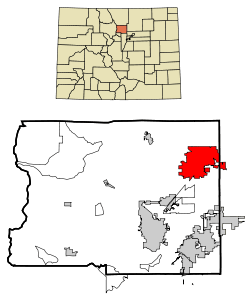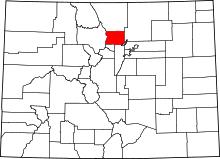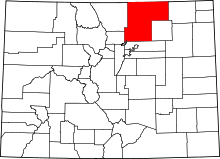Longmont, Colorado
| City of Longmont, Colorado | |
|---|---|
| Home Rule Municipality | |
|
Longmont Safety and Justice Center | |
 Location in Boulder County and the state of Colorado | |
| Coordinates: 40°10′18″N 105°6′33″W / 40.17167°N 105.10917°WCoordinates: 40°10′18″N 105°6′33″W / 40.17167°N 105.10917°W | |
| Country | United States |
| State | Colorado |
| Counties[1] |
Boulder County Weld County |
| Founded | 1871 |
| Incorporated | November 15, 1885[2] |
| Named for | Stephen Harriman Long and Longs Peak |
| Government | |
| • Type | Home Rule Municipality[1] |
| • Mayor | Dennis Coombs (List) |
| Area | |
| • Total | 27.6 sq mi (71.6 km2) |
| • Land | 26.2 sq mi (67.8 km2) |
| • Water | 1.5 sq mi (3.8 km2) |
| Elevation[3] | 4,984 ft (1,519 m) |
| Population (2010)[4] | |
| • Total | 86,270 |
| • Estimate (2014)[5] | 90,237 |
| • Density | 3,294/sq mi (1,272.0/km2) |
| Time zone | MST (UTC-7) |
| • Summer (DST) | MDT (UTC-6) |
| ZIP codes[6] | 80501-80504 |
| Area code(s) | Both 303 and 720 |
| FIPS code | 08-45970 |
| GNIS feature ID | 0202560 |
| Website |
www |
The City of Longmont is a Home Rule Municipality in Boulder and Weld counties of the U.S. state of Colorado. Longmont is located northeast of the county seat of Boulder and 33 miles (53 km) north-northwest of the Colorado State Capitol in Denver.
Longmont's population was 86,270 at the time of the 2010 U.S. Census.[7] Longmont is the 13th most populous city in the state of Colorado.
The word "Longmont" comes from Longs Peak, a prominent mountain named for explorer Stephen H. Long that is clearly visible from Longmont, and "mont", from the French word "montagne" for mountain.[8]
History
Longmont was founded in 1871 by a group of people from Chicago, Illinois. Originally called the Chicago-Colorado Colony, the men sold memberships in the town and with the proceeds purchased the land necessary for the town hall. As the first planned community in Boulder County, the city streets were laid out in a grid plan in a square mile. The city began to flourish as an agricultural community after the building of the Colorado Central Railroad line arrived northward from Boulder in 1877. During the 1940s, Longmont began to grow beyond these original limits.
During the 1960s the federal government built an air traffic control center in Longmont, and IBM built a large factory near Longmont. As agriculture waned, more high technology has come to the city, including companies like Seagate and Amgen; Amgen closed its Longmont campus in 2015. In April 2009, the GE Energy Company relocated its control solutions business to the area.
The downtown along Main Street, once nearly dead during the 1980s, has seen a vibrant revival in the 1990s and into the 21st century. During the mid-1990s, the southern edge of Longmont became the location of the first New Urbanist project in Colorado, called Prospect New Town, designed by the architects Andrés Duany and Elizabeth Plater-Zyberk.
The Longmont City Council in May 2013 voted to finance and build out its own municipal gigabit data fiber-optic network to every house and business over a three-year period starting in late 2013.
- Further information on Longmont's history, see The Official City of Longmont History and the Longmont Museum & Cultural Center.
Geography
Longmont is located in northeastern Boulder County at 40°10′18″N 105°06′33″W / 40.171583°N 105.109085°W.[9] The city extends eastward into western Weld County. U.S. Highway 287 (Main Street) runs through the center of the city, leading north 16 miles (26 km) to Loveland and south 34 miles (55 km) to downtown Denver. State Highway 119 passes through the city south of downtown and leads southwest 15 miles (24 km) to Boulder and east 5 miles (8 km) to Interstate 25.
The elevation at City Hall is 4,978 feet (1,517 m) above sea level. St. Vrain Creek, a tributary of the South Platte River, flows through the city just south of the city center.
According to the U.S. Census Bureau, Longmont has a total area of 27.6 square miles (71.6 km2), of which 26.2 square miles (67.8 km2) is land and 1.5 square miles (3.8 km2), or 5.30%, is water.[7]
Demographics
| Historical population | |||
|---|---|---|---|
| Census | Pop. | %± | |
| 1880 | 773 | — | |
| 1890 | 1,543 | 99.6% | |
| 1900 | 2,201 | 42.6% | |
| 1910 | 4,256 | 93.4% | |
| 1920 | 5,848 | 37.4% | |
| 1930 | 6,029 | 3.1% | |
| 1940 | 7,406 | 22.8% | |
| 1950 | 8,099 | 9.4% | |
| 1960 | 11,489 | 41.9% | |
| 1970 | 23,209 | 102.0% | |
| 1980 | 42,942 | 85.0% | |
| 1990 | 51,555 | 20.1% | |
| 2000 | 71,093 | 37.9% | |
| 2010 | 86,270 | 21.3% | |
| Est. 2015 | 92,088 | [10] | 6.7% |
As of the census[12] of 2010, there were 86,270 people residing in the city (2014 estimate: 90,237). The population density was 3,294 people per square mile. There were 35,008 housing units. The racial makeup of the city was:
- 83.3% White
- 0.9% African American
- 1.0% Native American
- 3.2% Asian
- 0.1% Pacific Islander
- 8.6% from other races
- 2.9% from two or more races.
- Hispanic or Latino of any race were 24.6% of the population.
There were 33,551 households out of which 36.9% had children under the age of 18 living with them, 54.6% were married couples living together, 10.1% had a female householder with no husband present, and 30.8% were non-families. 23.7% of all households were made up of individuals and 7.3% had someone living alone who was 65 years of age or older. The average household size was 2.64 and the average family size was 3.15.
In the city the population was spread out with 28.6% under the age of 20, 6.3% from 20 to 24, 27.6% from 25 to 44, 26.2% from 45 to 64, and 11.1% who were 65 years of age or older. The median age was 36 years.
The median income for a household in the city was $58,698, and the median income for a family was $70,864. Males had a median income of $51,993 versus $41,025 for females. The per capita income for the city was $29,209. About 11.1% of families and 14.7% of the population were below the poverty line, including 21.4% of those under age 18 and 8.2% of those age 65 or over.
In 2011 Longmont was rated the 2nd safest city in Colorado.[13]
Education
Longmont is home to the Boulder County Campus of Front Range Community College, the St. Vrain Valley School District, and to a number of private schools. Longmont is also home to the Master Instructor Continuing Education Program (MICEP) a voluntary accreditation program for aviation educators.
Transportation
Longmont is part of the RTD transit district that provides local and regional bus service to Denver and Boulder.
Outside of RTD, Longmont is connected to Fort Collins, Loveland, and Berthoud via a FLEX regional bus service.
In 2012, Longmont was recognized by the League of American Bicyclists as a silver-level bicycle-friendly community. Longmont is one of 38 communities in the United States to be recognized with this distinction. It is the only city in Colorado placed at the silver level that is not a major tourist center or a university city.[14]
Media
The Longmont Times-Call is the local daily newspaper.
Longmont's radio stations include KRCN, KGUD, and KKFN. Country music is broadcast on KWOF from a tower about 10 miles (16 km) southeast of Longmont. Also located nearby is KDSP with a progressive talk format. The KDSP transmitter site is about 15 miles (24 km) east of Boulder.
NPR programming can be heard on Colorado Public Radio stations KCFR from Denver, and KCFC in Boulder. The NPR affiliate KUNC from the Fort Collins-Greeley market can also be heard in Longmont.
Longmont is also served by Pacifica Radio affiliate KGNU, a non-commercial community radio station from Boulder.
The Longmont Compass is the local online events, entertainment and lifestyle resource.
Economy
According to the Longmont Area Economic Council,[15] the top ten employers in Longmont are:
- St. Vrain Valley Schools (regional school district) with 3960 employees
- Seagate Technology with 1381 employees
- Longmont United Hospital with 1257 employees
- DigitalGlobe with 918 employees
- Intrado with 858 employees
- The City of Longmont with 818 employees
- Circle Graphics with 590 employees
- The Federal Aviation Administration with 543 employees
- McLane Western with 435 employees
- Crocs with 370 employees
In addition, Longmont supports a thriving craft brewing industry as well as many recreational and travel-related businesses. Local breweries include Left Hand, Oskar Blues, 300 Suns, GrossenBart, Shoes & Brews and Wibby Brewing.[16] Due to its proximity to the Rocky Mountain National Park, Longmont is home to many hotels, restaurants, and other businesses that cater in part to the tourists visiting the park each year. One recreational business that calls Longmont home is Mile Hi Skydiving, which is one of the largest skydiving facilities in the state of Colorado. Longmont is also home to the World's Largest Sticker Ball at StickerGiant, a custom sticker and label printing company on the city's east side. TinkerMill, the largest makerspace in the region, is located in Longmont. Other businesses support skiing and other snowsports, bicycling, and rock climbing.
Government
This is a list of mayors of Longmont.[17]
| Mayor | Term |
|---|---|
| L. H. Dickson | 1881–1885 |
| George T. Dell | 1885–1887 |
| Charles H. Baker | 1887–1888 |
| John B. Thompson | 1888–1889 |
| Ira L. Herron | 1889–1890 |
| Frank Stickney | 1890–1892 |
| John A. Buckley | 1892–1894 |
| Neil C. Sullivan | 1894–1896 |
| George W. Coffin | 1896–1897 |
| Willis A. Warner | 1897–1898 |
| Frank M. Downer | 1898–1899 |
| Frank M. Miller | 1899–1901 |
| John A. Donovan | 1901–1903 |
| Samuel C. Morgan | 1903–1905 |
| Charles A. Bradley | 1905–1909 |
| Frank P. Secor | 1909–1911 |
| Rae H. Kiteley | 1911–1921 |
| James F. Hays | 1921–1927 |
| Fred W. Flanders | 1927–1929 |
| Earl T. Ludlow | 1929–1931 |
| Ray Lanyon | 1931–1943 |
| Fred C. Ferguson | 1943–1947 |
| George A. Richart | 1947–1949 |
| Otto F. Vliet | 1949–1957 |
| Richard C. Troxell | 1957–1959 |
| Albert Will | 1959–1961 |
| Ralph R. Price | 1961–1969 |
| Alexander Zlaten | 1969–1971 Pro Tem |
| Wade Gaddis | 1971–1973 Pro Tem |
| Austin P. Stonebreaker | 1973–1974 |
| Alvin G. Perenyi | 1975–1977 |
| George F. Chandler | 1977 Pro Tem |
| E. George Patterson Jr. | 1977–1979 |
| Robert J. Askey | 1979–1981 |
| William G. Swenson | 1981–1985 |
| Larry Burkhardt | 1985–1987 |
| Alvin E. Sweney | 1987–1989 |
| Fred Wilson | 1989–1993 |
| Leona Stoecker | 1993–2001 |
| Julia Pirnack | 2001–2007 |
| Roger Lange | 2007–2009 |
| Bryan L. Baum | 2009–2011 |
| Dennis L. Coombs | 2011–present |
Notable people
- Miles Bergner, 2013 U.S. Army All-American Bowl participant, West Team,[18] kicker at the University of South Dakota.
- Greg Biekert, professional football player (played football for Longmont High School[19])
- Vance D. Brand, former astronaut[20]
- Kylie Ireland, pornographic actress and producer (born in Longmont)
- John R. Kelso, congressman and author (lived and died in Longmont)[21]
- Kody Lostroh, 2009 Professional Bull Riders World Champion
- Mr. Money Mustache, financial blogger and inventor of the terms "Badassity" and "Complainypants"
- David Pauley, pitcher for the Detroit Tigers[22]
- Jack Reynor, Irish actor (born in Longmont)
- Kristen Schaal, comedian and actress, grew up in Longmont[23]
- Dan Simmons, author (1990 Hugo Award winner)[24]
- Fred Stone, stage and film actor
- William Oxley Thompson, pastor of Central Presbyterian Church (Longmont), president of Longmont Presbyterian College, president of Miami University of Ohio, president of Ohio State University
- Ed Werder, ESPN television commentator (born in Longmont)
- Justin Wilson, IndyCar driver
Sister cities
Longmont is a sister city of these municipalities:
See also
- Outline of Colorado
- State of Colorado
- Chivington Drive: the council took the decision to rename the city street following two decades of protests that it honored the soldier who was responsible for the Sand Creek Massacre of 1864.
References
- 1 2 "Active Colorado Municipalities". State of Colorado, Department of Local Affairs. Retrieved September 1, 2007.
- ↑ "Colorado Municipal Incorporations". State of Colorado, Department of Personnel & Administration, Colorado State Archives. December 1, 2004. Retrieved September 2, 2007.
- ↑ "US Board on Geographic Names". United States Geological Survey. 2007-10-25. Retrieved 2008-01-31.
- ↑ "American FactFinder". United States Census Bureau. Retrieved June 12, 2015.
- ↑ "Population Estimates". United States Census Bureau. Retrieved June 12, 2015.
- ↑ "ZIP Code Lookup" (JavaScript/HTML). United States Postal Service. Retrieved November 15, 2007.
- 1 2 "Geographic Identifiers: 2010 Demographic Profile Data (G001): Longmont city, Colorado". U.S. Census Bureau, American Factfinder. Retrieved September 26, 2013.
- ↑ Gannett, Henry (1905). The Origin of Certain Place Names in the United States. U.S. Government Printing Office. p. 190.
- ↑ "US Gazetteer files: 2010, 2000, and 1990". United States Census Bureau. 2011-02-12. Retrieved 2011-04-23.
- ↑ "Annual Estimates of the Resident Population for Incorporated Places: April 1, 2010 to July 1, 2015". Retrieved July 2, 2016.
- ↑ "Census of Population and Housing". Census.gov. Retrieved June 4, 2015.
- ↑ "American FactFinder". United States Census Bureau. Retrieved 2015-03-07.
- ↑ http://www.timescall.com/ci_19618937?source%253Dmost_viewed.20F88DA3D7D369F5BB70F372987EAE1F.html
- ↑ Wegrzyn, Magdalena. "Longmont More Bike-Friendly Than Ever". Longmont Times Call Newspaper. Longmont Times Call Newspaper. Retrieved May 15, 2012.
- ↑ Longmont Area Economic Council (March 2015). "LONGMONT AREA TOP EMPLOYERS" (PDF). Retrieved March 2015. Check date values in:
|access-date=(help) - ↑ http://www.visitlongmont.org
- ↑ "Mayors of Longmont since 1881". City of Longmont. November 13, 2007. Retrieved May 2, 2009.
- ↑ http://usatodayhss.com/2012/football-longmonts-miles-bergner-named-to-u-s-army-all-american-bowl
- ↑ "Looking back at Colorado's best". Denver Post. November 30, 2006. Retrieved 2010-08-25.
- ↑ "Astronaut Bio: V.D. Brand". National Aeronautics and Space Administration. April 2008. Retrieved May 7, 2009.
- ↑ "KELSO, John Russell". Biographical Directory of the United States Congress. Retrieved 2010-08-25.
- ↑ "David Pauley Stats, Bio, Photos, Highlights". Major League Baseball. Retrieved 2011-08-16.
- ↑ The Kooky Monster – The Age, March 13, 2008. Retrieved on May 16, 2008.
- ↑ Evans, Clay (February 7, 2007). "Myth and madness in the frozen north". Boulder Daily Camera. Retrieved February 19, 2010.
External links
- City of Longmont official website
- CDOT map of the City of Longmont
- History of Longmont
- Longmont Times-Call (local newspaper)
- Longmont Channel 8 (public-access television station)
- Visit Longmont - the official website for travel information (Visit Longmont)
- Free Range Longmont - Progressively better news - based in Longmont (Free Range Longmont)
- Amgen campus closing: http://www.longmont.org/Longmont/media/Longmont/PDF%20Files/LAEC-Economic-Update-December-15.pdf?ext=.pdf

